by Anna, Alp, Cemre, Carolin, Emre, Mustafa and Pam
Dear reader,
Welcome to our blog and thank you for letting us guide you through the topic of food waste in Germany and Türkiye. This blog will show how we can learn from each other and how to save money by saving food.
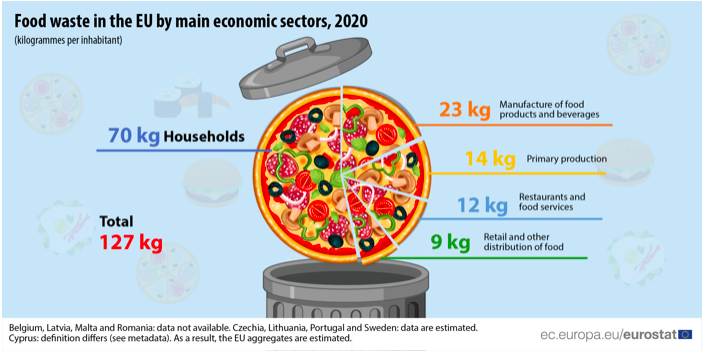
Worldwide, we waste 1.3 billion tonnes of food per year (Read more about it here.). As you can see in the above picture, households make up one of the biggest parts of food waste (Food waste: 127 kg per inhabitant in the EU in 2020, 2022), which is why we want to focus on you, at home, reading this article. We want to highlight how Türkiye and Germany can learn from each other and, of course, how you can SAVE MONEY AND TIME by avoiding food waste!
Food Waste in Türkiye and Germany
As per the Daily Sabah, in Türkiye, an estimated 11.3 million tons of food waste are produced annually. This means food waste is a significant problem in Türkiye. The Daily Sabah also refers to a study, claiming, that “[most] people prefer shopping for more groceries before consuming all they already have, and often purchase more food than they can consume and which they do not need immediately.” (Turkey wastes 11.3 million tons of food annually | Daily Sabah, 2021). According to another study, published by the Turkish Ministry of Food, Agriculture and Livestock, the main reasons for food waste were overbuying, cooking too much food, and not consuming food after its expiration date (FAO, 2020).
The good news is that Türkiye is already taking steps towards reducing food waste. Firstly, the government has launched campaigns to raise awareness about the issue and implemented regulations in the food industry to manage food waste, such as the “Save your Food” campaign, which was launched by FAO and the Ministry of Agriculture and Forestry of Türkiye in 2020 (Food loss and waste reduction campaign of FAO and Turkey takes off, 2020). This is also visible in the below figure of policy mix in Türkiye (Turkey – Summary of Policies and Legislation for Food Waste Prevention and Reduction, 2015).
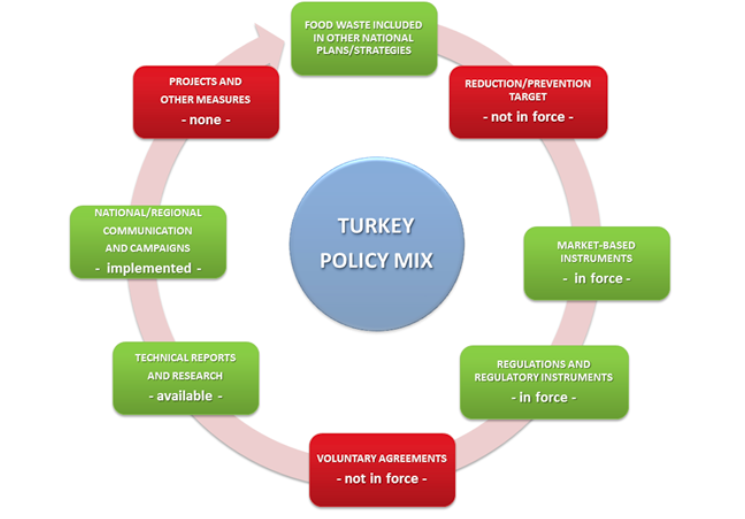
Figure 2: Figure 2: Türkiye’s policy mix on tackling food waste
As for Germany; despite significant efforts, food waste still remains a huge problem, with an estimated 11 million tons of food wasted annually, as per 2020 (BMEL – Food waste – National Strategy for Food Waste Reduction, 2022). There has been significant progress, though, when it comes to reducing food waste in recent years. The government has implemented various measures, such as a national strategy to reduce food waste and a food waste prevention program that funds projects aimed at reducing food waste. An example is the initiative “Zu gut für die Tonne”[1], which aims at educating the public through blog posts, recipes, ideas on how to avoid food waste and more (Too Good For The Bin, no date). Additionally, many supermarkets and food retailers have introduced initiatives to reduce food waste, such as donating unsold food to charities and food banks, such as “Die Tafel”[2] – an organisation that provides food and groceries to those in need, among other things (Die Tafeln: Lebensmittel retten. Menschen helfen., no date).
Below image shows the reasons for food waste in German households. Most often, it is because products spoil. However, cooking too much, food looking unsavoury or buying too much are also reasons. Only 5 % of food waste occur due to a past best before date (Lebensmittelverschwendung vermeiden, no date)
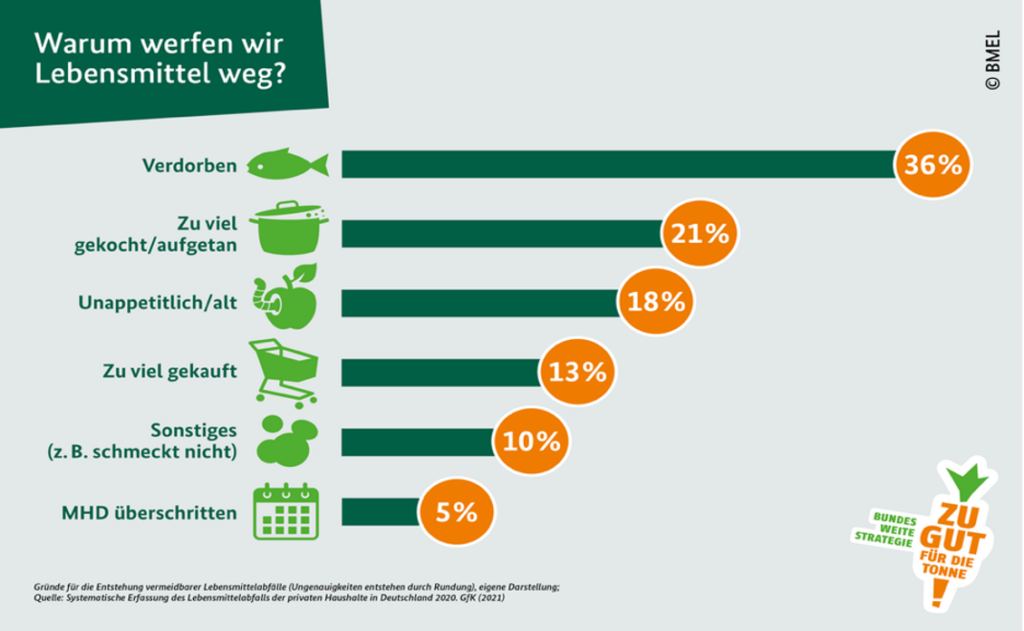
[1] https://www.zugutfuerdietonne.de [2] https://www.tafel.de/english-information
While Türkiye and Germany have different approaches to tackling food waste, both countries face significant challenges in reducing food waste. As mentioned before, we want to focus on what we could learn from one another. As part of our intercultural approach, we went out to our grandparents to find out, how food was preserved and food waste avoided in past times, trying to find a connection between the two countries. Based on our findings, we compiled a list of ways to avoid and reduce food waste on household levels. Each point may be implemented by any country.
1. Understanding expiration dates
Expiration dates can be confusing, especially since all foods are required to have them, even if spoiling is extremely unlikely (i.e. honey). However, understanding them can help you avoid food waste and thereby saving money. „Sell by“ and „best before“ dates refer to the quality of the food, not its safety and are often still good to be consumed after said date has passed. „Use by“ dates, however, refer to the safety of the food, which should be consumed by that date. If stored correctly, it is possible that they will still be good after that date has passed. Smelling it or tasting a little of such food can help determining, if it is still safe to eat.
2. Buy only what you need
This is probably the easiest, most obvious and most important one!!! Yet… many people buy too much food!! So, what could be a good strategy to avoid it? A good idea would be to plan your meals ahead and make a shopping list before grocery shopping. There are actually great apps that can help with that (i.e. To-Do, by Microsoft). It is also important to stick to the list and avoid impulse purchases (i.e. don’t go shopping, when you are hungry!!). Buying only what you need will not only reduce food waste, but it will also save you loads of money!! And we all like to save money, right?
3. Properly store food
Proper food storage is essential to avoid spoilage and waste. Keep perishable food in the fridge, at the right temperature, and store it in airtight containers and make sure to put newer items at the back of the fridge or pantry and use the older ones first – Check out this guide on how to organise your fridge. It’s also good to consume “ready to eat foods” as soon as possible, to avoid spoilage.
4. Get creative with leftovers
Leftovers don’t have to be boring. Get creative with your leftovers and turn them into new dishes. There are plenty of videos on YouTube about this very topic! For example, leftover roasted vegetables can be turned into a frittata, and leftover chicken can be used to make a pot pie.
Here’s a recipe for a “left over stew”, by the French Cook Jacques Pépin:
5. Usage of food scraps
This one is important. Don’t throw away food scraps. Use them to make broth. Vegetable scraps, such as carrot tops, onion peels, and celery leaves, can be used to make a flavourful broth. Yes, it may sound like hard work, but our grandparents mostly made them that way and they were delicious. If there aren’t enough scraps from one meal, you can also freeze them in an airtight container and make the broth, once you’ve collected enough of them. Simply add all the scraps (the more the merrier) and water to a pot and boil until the broth tastes nice. You may add some salt, laurel or other spices, too, if you like.
6. Freeze food
If you own a freezer, you can freeze any leftovers. Frozen food can last for months and can be thawed when needed. Freezing food in sizes of 1-2 portions also avoids food waste when thawing. Just be sure to label and date your frozen items, so you know what and when it was frozen. One more important thing when it comes to freezing: use freezer-safe containers to avoid freezer burn and make sure to properly wrap items to avoid freezer odours!
7. Donate food
If you have excess food that you know you won’t be able to consume, consider donating it to a local food bank or shelter. This can help reduce food waste and also support those in need. In Türkiye, i.e. it is common to give stale bread to the milk men who will use it on their farm, while in Germany more and more food sharing fridges appear, where you can bring your leftover groceries, i.e. before going on holidays.
8. Share food with others
If you have excess food that you won’t be able to consume, consider sharing it with others. Host a potluck with friends or bring extra food to work or school to share with colleagues.By incorporating (some of) these tips into your daily routine, you can not only reduce food waste and help create a more sustainable food system, but you will also be able to save money.
Since we learned, that buying too much food is one of the main problems, we want to take a little detour into extending the shelf life of food, with the below ideas, gathered from our grandparents as well as AZO Life Sciences (Tariq, 2021).
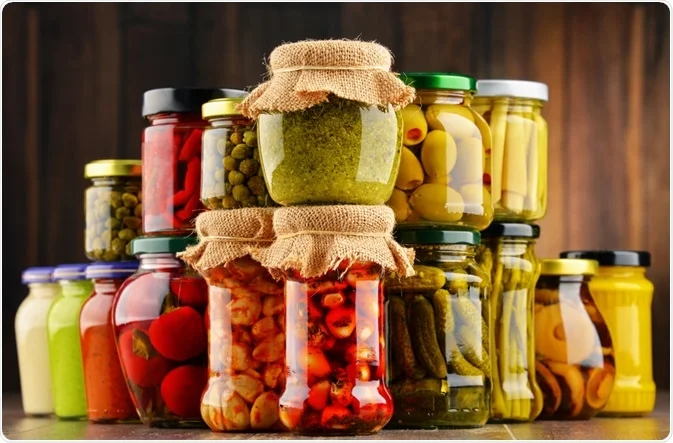
These following methods are usually quite simple and require minimal resources, making them accessible to people of all backgrounds. So, don’t be shy to try them.
1. Pickling
Pickling is a method to preserve fruits and vegetables by soaking them in vinegar or brine. This method allows the produce to be stored for months and may also add flavour to the food. Common examples include sauerkraut and cucumber pickles. Check out this recipe, for cucumber pickles.
2. Curing
Curing is a method of preserving meat by rubbing it with salt and other seasonings. This method removesmoisture from the meat, preventing bacterial growth and allowing it to be stored for months. Most common examples include salami or Parma ham.
3. Honey Preservation
Honey is used to preserve fruits and nuts. The fruit or nut are placed in a jar or container and covered with honey, which prevents bacterial growth and therefore preserves the food. Honey also adds a sweet flavour. For those of you, who want to try it (at your own risk, of course) check out this link.
4. Oil Preservation
Oil is being used for preservation for a long time. As well as the previous methods, it prevents bacterial growth and therefore preserves the products. One of the most common examples are sundried tomatoes in a jar – preserved with oil.
By following these simple tips, we can all contribute to reducing food waste and creating a more sustainable future.
One last message!
Food is a topic that concerns every person on this planet. It is essential for our survival. Food waste is a global issue, that requires a collaborative effort from governments, industries, and individuals alike. Reducing food waste not only benefits the environment but also has economic and social benefits, such as reducing food insecurity and improving resource efficiency as well as the reduction of CO² emissions. For our purposes, we looked at Türkiye and Germany, two countries that have already taken steps towards reducing food waste, but still need to achieve significant progress.
By raising awareness about the issue and implementing effective measures, we can work towards a more sustainable and equitable food system. Governments and businesses can play a significant role in reducing food waste by implementing policies and initiatives that encourage sustainable practices, but individuals especially can contribute by being mindful of their food consumption and waste, buying only what they need, and properly storing and consuming food before its expiration date as we learned before.
Together, we can make a significant impact in reducing food waste and creating a more sustainable future. By sharing best practices and innovations, we can learn from each other and work towards a common goal of reducing food waste globally. It is not an individual’s issue, it is a problem we share and that will be solved only by working together.
If you enjoyed this and are as excited about this topic as we are, we would love it, if you spread the word. Talk to your family, friends, neighbours and colleagues about it. Talk about your experiences, recipes using up left-overs, tips and tricks you know about.
As FAO and the Turkish Ministry of Agriculture and Forestry say: “SAVE YOUR FOOD. YOUR ACTIONS MATTER” (FAO, 2020).
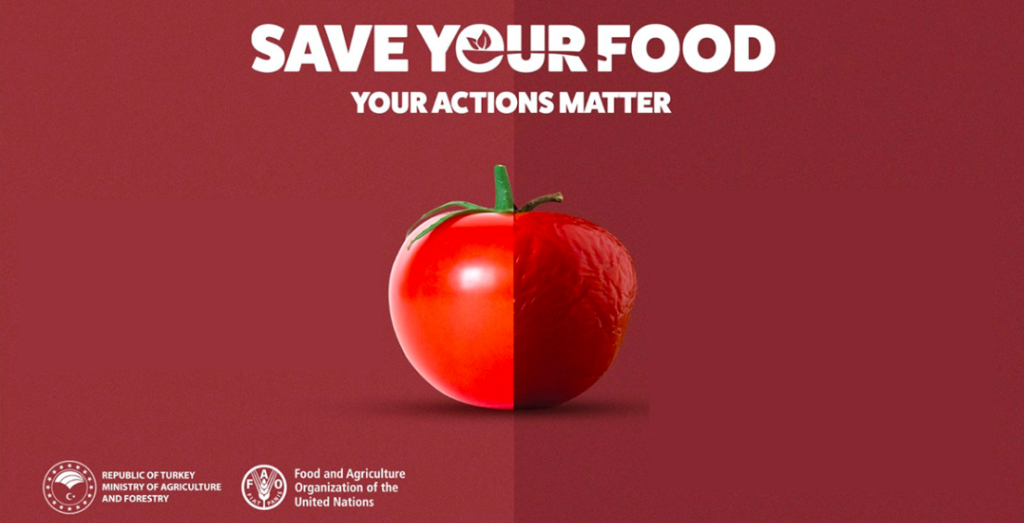
About us
You might be wondering, what’s food waste got to do with saving money or why we chose to focus on Germany and Türkiye. But who IS we? We are 7 students, from Trabzon, Türkiye and Lüneburg, Germany: Anna, Alp, Cemre, Carolin, Emre, Mustafa and Pam. We have been working together, all semester, to learn about intercultural communication, food waste and all that comes with it. This blog was written as part of a seminar. The idea was to not only get to know each other, but see what we could learn from each other. Our personal goal was to focus on things we have in common instead of things we don’t.
Sources
BMEL – Food waste – National Strategy for Food Waste Reduction (2022). Available at: https://www.bmel.de/EN/topics/food-and-nutrition/food-waste/national-strategy-for-food-waste-reduction.html#doc77578bodyText2 (Accessed: 3 August 2023).
Die Tafeln: Lebensmittel retten. Menschen helfen. (no date). Available at: https://www.tafel.de/ (Accessed: 3 August 2023).
FAO (2020) Save your food – Your actions matter: Turkey’s National Strategy Document on Prevention, Reduction and Monitoring of Food Loss and Waste and its Action Plan. Rome, Italy: FAO. Available at: https://www.fao.org/documents/card/ar/c/CB1074EN (Accessed: 3 August 2023).
Food loss and waste reduction campaign of FAO and Turkey takes off (2020) Food and Agriculture Organization of the United Nations. Available at: http://www.fao.org/save-food/news-and-multimedia/news/news-details/en/c/1276400/ (Accessed: 3 August 2023).
Food waste: 127 kg per inhabitant in the EU in 2020 (2022). Available at: https://ec.europa.eu/eurostat/web/products-eurostat-news/-/ddn-20220925-2 (Accessed: 3 August 2023).
Lebensmittelverschwendung vermeiden (no date). Available at: https://www.bzfe.de/nachhaltiger-konsum/lagern-kochen-essen-teilen/lebensmittelverschwendung/ (Accessed: 3 August 2023).
Tariq, S. (2021) Food Preservation Methods, AZO Life Sciences. Available at: https://www.azolifesciences.com/article/Food-Preservation-Methods.aspx (Accessed: 3 August 2023).
Too Good For The Bin (no date). Available at: https://www.zugutfuerdietonne.de/navigation/sub-footer-navigation/english (Accessed: 3 August 2023).
Turkey – Summary of Policies and Legislation for Food Waste Prevention and Reduction (2015). Available at: https://www.eu-fusions.org/index.php/country-reports/reports/302-turkey (Accessed: 3 August 2023).
Turkey wastes 11.3 million tons of food annually | Daily Sabah (2021). Available at: https://www.dailysabah.com/turkey/turkey-wastes-113-million-tons-of-food-annually/news (Accessed: 3 August 2023).

